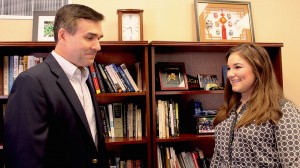
Madison Gable visits with Albert Nylander.
OXFORD, Miss. – As a McLean Institute Innovation Scholar within the Catalyzing Entrepreneurship and Economic Development, or CEED, Initiative at the University of Mississippi, Madison Gable will work alongside other UM students to establish partnerships in rural Mississippi communities during the next two years.
Gable was born into a family that has resided in Mississippi for many generations. After living briefly in other states and across Mississippi, she said she understands her state’s unique challenges from an intimate perspective.
As a McLean mentor, Gable traveled to neighboring counties to tutor elementary and middle school students.
“Seeing the disparities between their opportunities and my own was a turning point,” the Ole Miss junior said.
Moving away from the Coast to attend UM gave Gable an opportunity to view her home from a distance, allowing her to appreciate the distinct educational opportunities coastal schools offer. She said her early exposure to the art, music and “gifted” programs at East Hancock Elementary were essential to her academic success.
Her Hancock High School teachers were committed to their students’ social education and set an example by using their education to serve others, Gable said.
As a freshman at Ole Miss, she sought opportunities that would allow her to follow their lead. That’s when she began volunteering with the McLean Institute’s mentoring program during its pilot semester.
Vaughn Grisham, a leader in the field of community development, founded the McLean Institute. The McLean Institute is in the process of a dramatic expansion as part of UM 2020, the university’s strategic plan, which calls for an increase in service to benefit Mississippi. The McLean Institute seeks to make community engagement a distinctive part of the educational culture at UM by promoting engaged scholarship and reflective community action.
In her time volunteering, Gable said she realized that most Mississippi children have minimal exposure to art, music or other activities to enrich their academics, and, more importantly, lives overall.
“Not only have I observed the educational deficits these children face, but I have come to learn about their insufficient access to medical care,” she said. “Many struggle with undiagnosed learning disabilities and problems with their sight that further complicate learning.
“The dedicated staff does their best to make up for the lack of doctors and psychologists, working hard to uncover these problems and proceed toward resolutions.”
Seeing their example, Gable found it was not enough to just serve these organizations, but that she must learn firsthand how to initiate social entrepreneurship endeavors that help spur change in the education and economic opportunities within her state.
Social entrepreneurship is the attempt to use business techniques to find solutions to social problems. Gable discovered social entrepreneurship while working with the McLean Institute and was inspired to promote social entrepreneurship when her mother, Stephanie Gable, founded Gulf Coast Breastfeeding Center LLC, the only private practice breastfeeding center in the state at the time, in November 2014.
By helping mothers and infants successfully breastfeed, Stephanie Gable has created an entirely new environment for Gulf Coast women and children.
“By using her business to advocate for a breastfeeding norm, my mom is helping to solve education and health care issues rooted in social problems, which is my aim as an innovation scholar,” Madison Gable said.
This summer, Gable began working toward that end by launching smART Art and Wellness Day Camp in Vardaman with two fellow CEED Scholars. For the month of June, Gable and her partners taught 32 students, ages 4-13, about art history and health.
This experiential learning opportunity taught Gable about community partnership and program administration.
“Madison’s role as an innovation scholar at the McLean Institute provides her to engage her background from the Coast to advance the mission of the McLean Institute,” said J.R. Love, CEED project manager.
The goal of each innovation scholar is to develop a specific sustainable solution within a community. The scholars attain the solutions by making connections with communities and by developing a method of research that includes participating in a summerlong internship in their chosen community.
Each scholar then presents some sort of business plan or research paper at the end of two years.
Going forward, Gable said she is considering focusing her efforts on promoting early education and reducing the barriers that make it difficult for sustainable food producers to enter markets, thereby boosting economic development in the state.